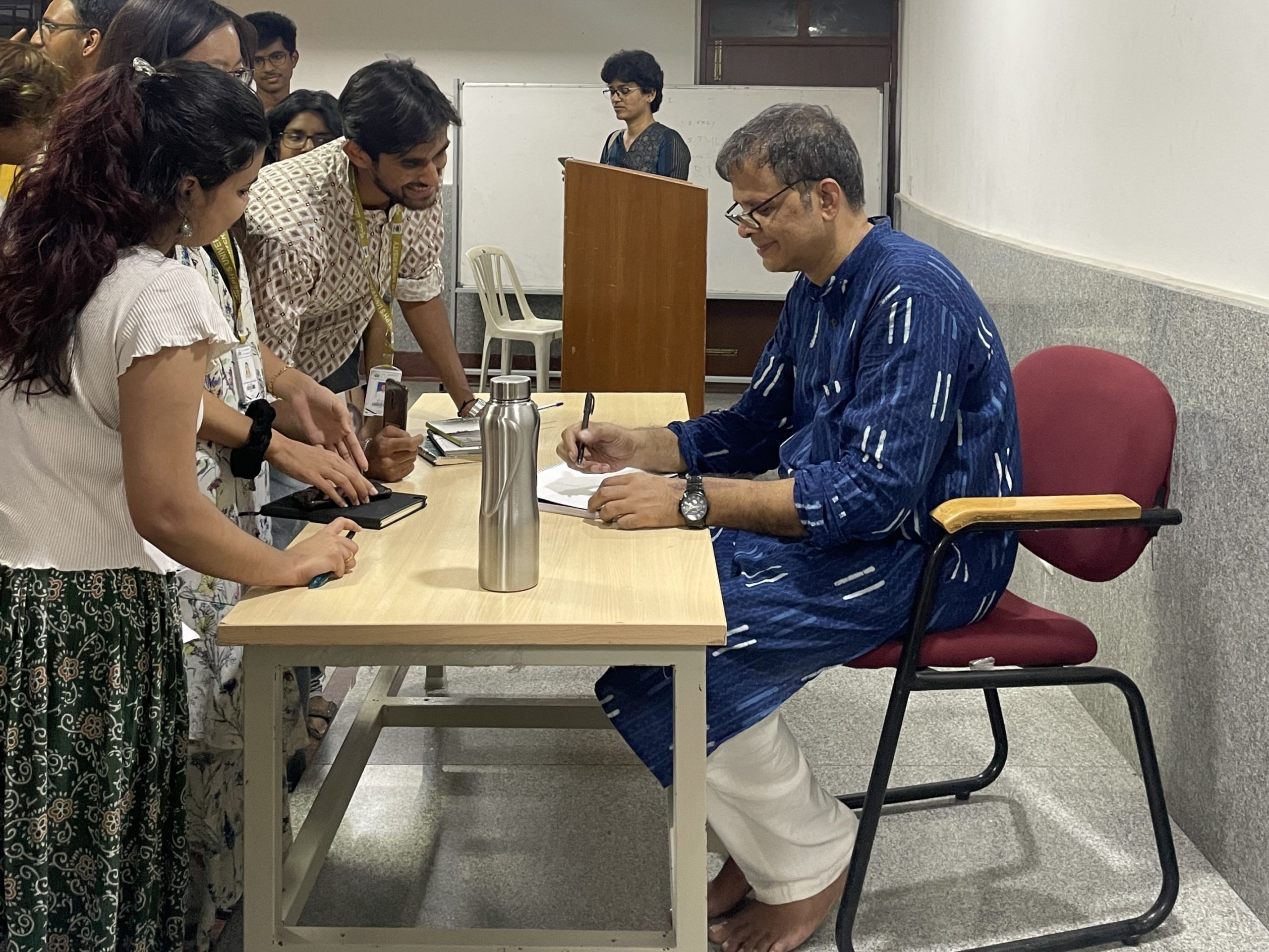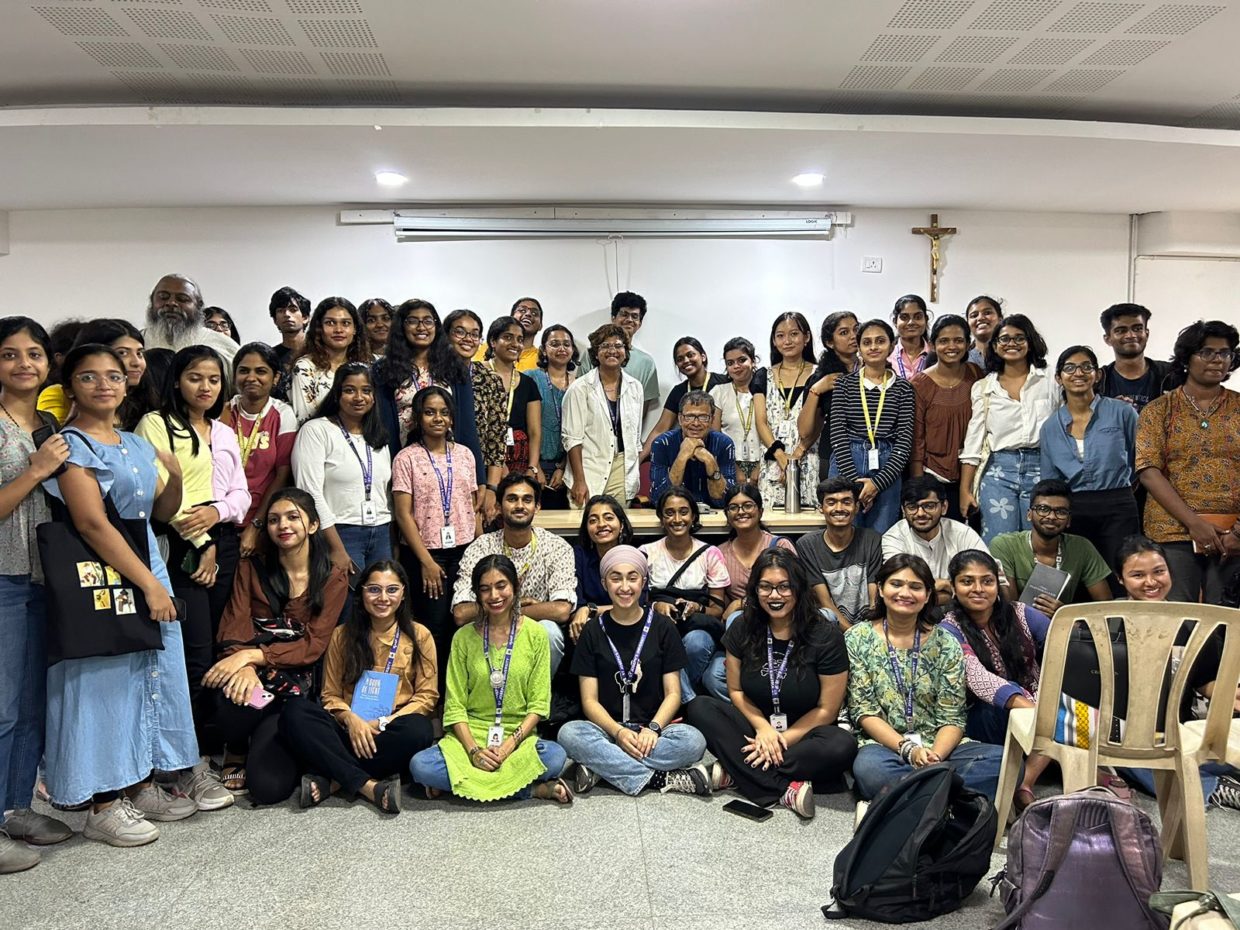Jerry Pinto is a man of many words. And when you are a man of many words, it is very difficult to choose them all with care and simultaneously fill a room of two hundred with laughter at two in the afternoon. On 22nd August 2023, the writer was in conversation with the students of St. Joseph’s University at a workshop on reading poetry. The Literary Society, Department of English in association with Prakriti Foundation, a socio-cultural association, hosted a two-hour workshop that divulged and demonstrated the joys and “long-term, wild consequences” of reading.
“Read it shamelessly, ridiculously, theatrically” is what Jerry Pinto has to say about reading poetry aloud. His emphatic recitations of poems – from Frost to Gulzar – that he carries with him like the favourite stuffed animal that goes everywhere the little girl goes, demonstrated this shamelessness so uncompromisingly, that it filled you with the urge to get up and start reciting random lines off the top of your head. His connection with poetry, and the thoroughness and faithfulness with which he displayed this connection, is a joyful thing to witness.

Credits: Lavanya Singh
“Always poetry has refused to believe what was believed to be true.” Jerry Pinto spoke about poetry as rebellion, as company, as impurity, as a mixture, as heterogeneity, and served this with a gusto that only an addict speaking on the subject of his addiction can muster. “How can you not want to consume poetry like big, hearty chunks of cake?” He talked of and recited Shakespeare’s most exquisitely deformed love poems, the Yeats that spread his dreams beneath Maud Gonne’s feet, Virginia Woolf as Elizabeth Barrett Browning’s dog, J.R. Ackerly’s animalistic obsession and the abhisarika in Robert Browning’s Porphyria’s Lover, with a keenness that is both self-indulgent and self-aware.
It is easy to forget that literacy is a privilege, especially when literacy has become, for many of us, a means to survive. “Has literacy just become part of your toolkit?” Throughout his workshop, Jerry Pinto reminded us of this privilege, of this access to reading that we more often than not take for granted, usually because reading is presented to us as an activity of labour or leisure, and not of love.
Dread towards reading poetry is something that begins long before we even know what poems are. Jerry Pinto took us back to Little Miss Muffet and her tuffet that no one knew the shape or feel of, which turned into a larger discussion on how the education system has not done poetry justice in the way in which it has been delivered to students. He talked about the limitations that are imposed on thought at all levels of education, which makes self-expression very precious to him. This flowed into a conversation on the limitations of language, the borrowing power of languages and what happens when languages fail to allow this intermingling. The hall resounded with laughter for a solid ten seconds after Jerry Pinto revealed to them that a necktie is called “kanthalangot” in Hindi.
The second half of the workshop was for questions. A student mentioned that she came across Jerry Pinto’s poetry for the first time in an English hour, and he was thrilled to know that his work was being read in our classes. He was asked questions about Indian poems, boring poems, favourite poems, writing poems and consuming poems. He dismantled the excuse of the writer’s block, divulged his obsession with A Clockwork Orange and tacky Bollywood music, gave us a few snippets of his poetry circle in Bombay, illustrated the knife-edge of the constant act of self-revelation that poets dance on, and warned us about contracts, “I agree” boxes and selling pieces of ourselves to big data.

Credits: Nasween Beig
There was a short address by the representative of the Prakriti Foundation, a photo and book signing session, after which, in a quiet corner of Faber Hall, away from mic wire and chair clutter, we stood around Jerry Pinto for his reading of I Want a Poem. Book in hand and spectacles raised, he transported us to the world of bhaandi-bartans and sexcapades with candlewax.
Jerry Pinto brought with him anecdotes, stories from across the world, poems of all kinds and a zest for reading that can only be described as sheer passion. This zest is one that is contagious, that makes you want to pick up a book and lap it up unflinchingly. “Every poem that you ever read is a staining… Your mind is tough, awesomely tough. It will take staining; it wants staining. It needs staining. It needs you to be feeding it various, multifarious stuff.”

Credits: Prof. Vijeta Kumar
Ananya Mehta
Latest posts by Ananya Mehta (see all)
- Keda, aamba, draaksh ane santra - 31st August 2023
- Poetry with Jerry: an exercise in staining - 24th August 2023





